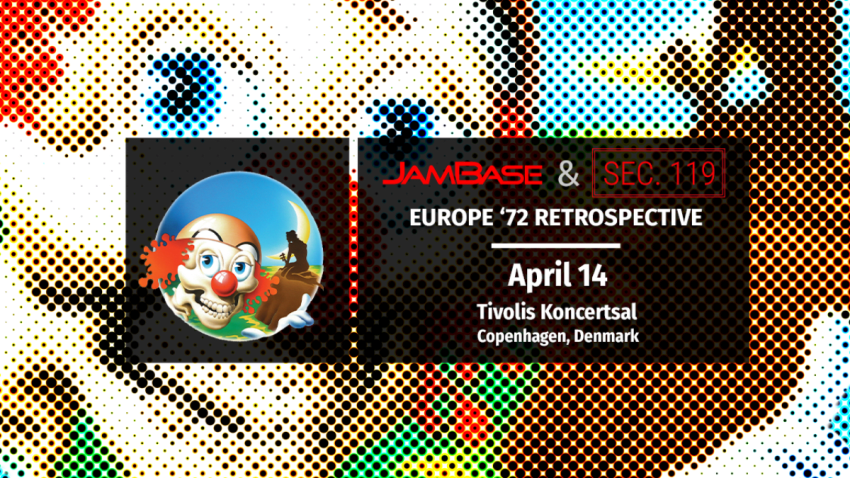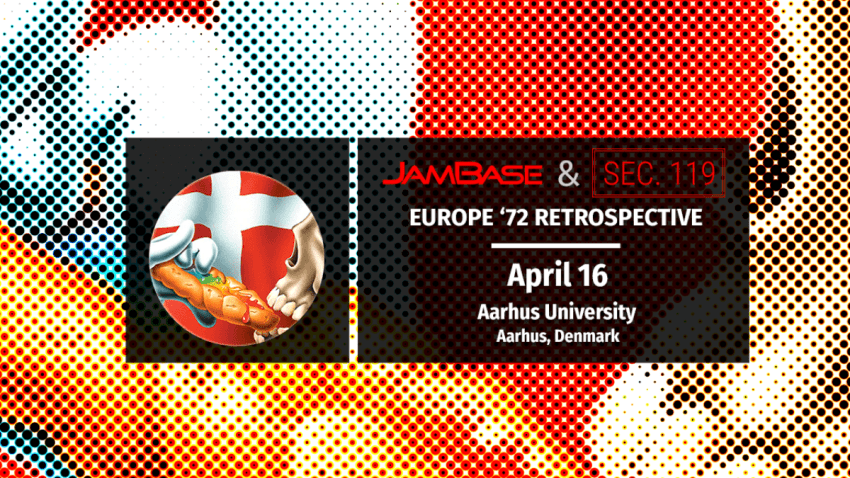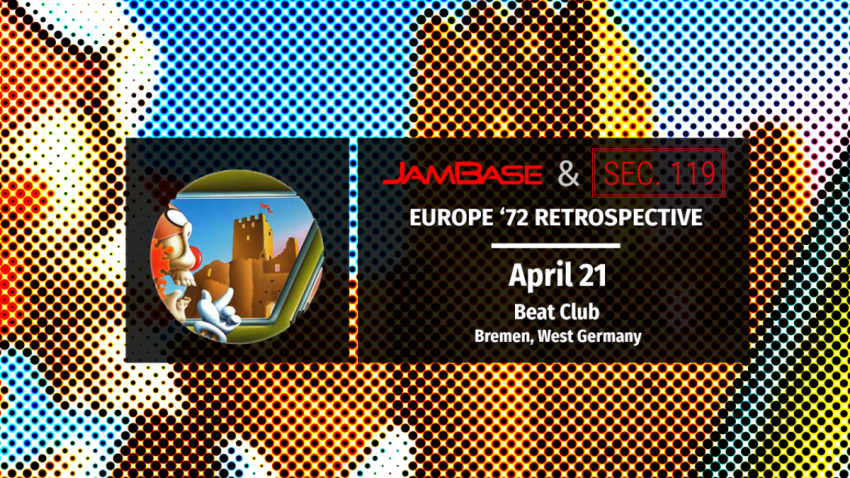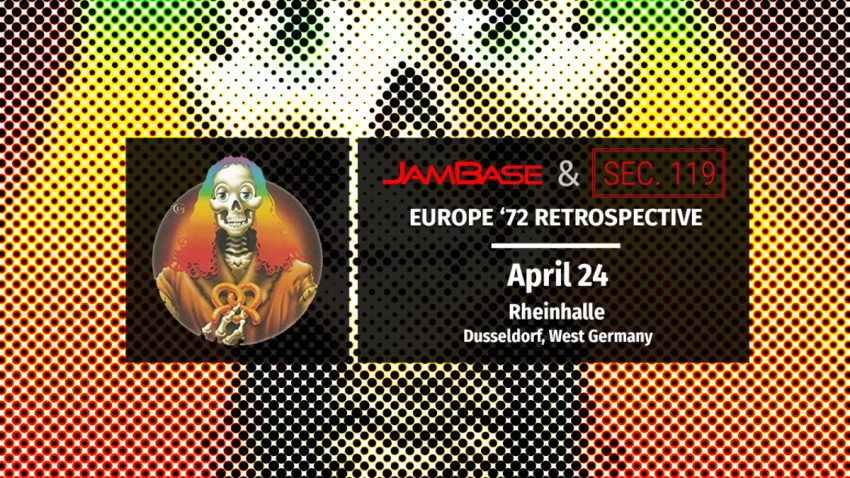Grateful Dead’s Europe ‘72 Tour 50th Anniversary: April 26 – Frankfurt, West Germany
Revisit the historic tour’s ninth performance, recorded at Jahrhunderthalle.
By Andy Kahn Apr 26, 2022 • 11:00 am PDT
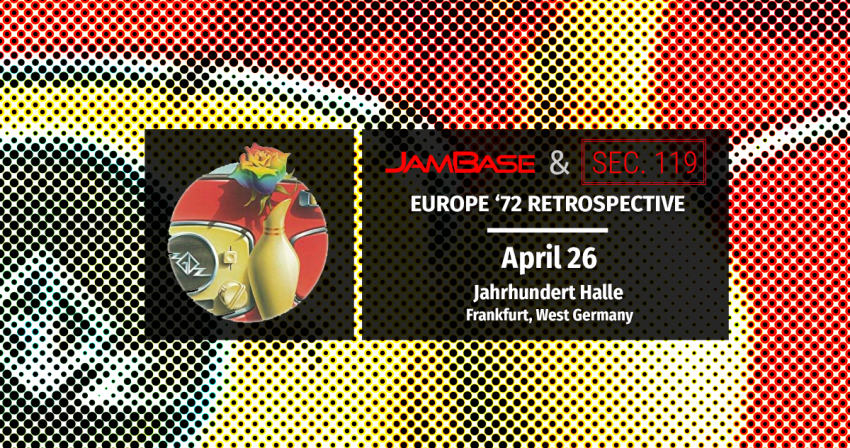
In April 1972, the Grateful Dead embarked on their now-legendary Europe ’72 Tour. The band performed 22 times between April 7 and May 26, resulting in the landmark triple live LP, Europe ’72 that was released in October of that year. To celebrate the legacy of the band’s historic tour abroad, JamBase presents a retrospective look back at each of the Europe 1972 Grateful Dead performances.
The Grateful Dead’s Europe ‘72 Tour continued its run through West Germany with a performance on Wednesday, April 26 at Frankfurt’s Jahrhunderthalle. The concert, the third of four the band played in Germany, followed a day off to travel the 220 kilometers southeast from Dusseldorf to Frankfurt.
The venue now called myticket Jahrhunderthalle (which translates to “Century Hall”) continues to host live concerts and other stage performances. Jahrhunderthalle’s website describes its history, stating (translated from German):
It’s not easy to let go of the futuristic sight of the myticket Centennial Hall. Friedrich Wilhelm Krämer’s building, completed in 1963, is elegant and still up to date. A manifesto of modernity. The myticket Jahrhunderthalle Frankfurt is one of the largest private cultural initiatives in Europe and traditionally stands for unprecedented democratic cultural experiences.
To mark the 100th anniversary of what was then Hoechst AG, the imposing domed building was opened in 1963 and dedicated to the employees and residents of the region. The house should open up holistically to the diverse cultural areas. True to the credo “Culture for everyone, open doors for everyone”, the myticket Centennial Hall still features a comprehensive, diverse stage program to this day. A melting pot for artists and people interested in art of all stripes.
In many respects, the house sets standards not only in the field of popular culture. The Centennial Hall is regarded as the birthplace of Rock’n’Roll in Germany and, in this tradition, continues the history of the great stage moments in the live music sector today as “Europe’s most famous stage.” In the early years it was unique performances by stars like Janis Joplin (’69) or Jimi Hendrix (’69), today it’s musicians like Coldplay or Rihanna who inspire a large audience on the stage of the myticket Centennial Hall.
The best ballet ensembles, the best-known rock stars, the most emotional musicals and the funniest comedians make guest appearances here. On the other hand, general meetings, presentations and incentives are just as popular as smaller employee parties, business meetings and private celebrations.
On the ground floor, on which the Kuppelsaal is enthroned, an additional universe of diversely usable rooms opens up to the visitor. The modernist design and the original details from the Charles Eames era unflinchingly reflect the authentic flair of the 1960s – originality that is more relevant today than ever.
In the areas of Kasino I Conference I Club & Bar, in addition to trade fairs and markets, unusual event concepts in a 1960s retro setting can also be realised. Celebrate where Frank Sinatra once took his gin. The park-like Green Area, including the body of water that surrounds the house, has hosted various open-air events and smaller outdoor festivals.
Most of the Dead’s April 26, 1972 concert was released in 1995, shortly after the death of guitarist Jerry Garcia that led to the end of the band. That album, Hundred Year Hall, was issued as a double CD on September 26, 1995. Lyricist Robert Hunter was tapped to provide and essay for the live album’s liner notes. Hunter began with this passage:
That run from Hamburg to Munich in two buses. Castles along the Rhine. Black Forest at night where werewolves roam. Bombed out ruins of old Heidelberg University. U.S. – Brit. post-war retaliatory blitz of gemutlich Germany, ancient before ever those snot nosed killers transformed high romance to schmaltz and wrecked the language for poets for generations to come. Too many lies had been told in it, concepts of the heart and the very words to say them expropriated for purposes of rape. We had lies of our own to tell, but not hateful ones. Told them with music. Had come to save the world but, starting in Germany, began to realize worlds cannot be saved. All are tentative. So we learned to dance on graves and be glad. None recover, they are just replaced. In 1972 the German Nation was still in shock, only halfway between then and now. We had Vietnam. All were crazy. None were sane. Hausfrauen at dawn, trying to scrub their patches of sidewalk free of blame, look up to see busloads of the Dead with red rubber noses waving, laughing. Register nothing. Continue scrubbing. Siehst du de Toten? Only the children see.
While promoting Hundred Year Hall, guitarist Bob Weir and bassist Phil Lesh were interviewed by Grateful Dead author and host of the Grateful Dead Hour radio program, David Gans. During the discussion, Lesh – who co-produced Hundred Year Hall with John Cutler – described a memorable experience at Jahrhunderthalle encountering his German doppelgänger. Here’s what Lesh told Gans and co-interviewer Marty Martinez:
Lesh: We went down to the [Jahrhunderthalle] to check it out. I’m looking at all the busts of the famous composers that are in the foyer, and everybody else has gone in, and Mountain Girl or somebody came back out and said, you gotta see this, man. So they took me up to the balcony, and we’re lookin’ down at the orchestra, they’re rehearsing “Carmen,” and they say, well, do you see anything unusual down there? And I say, no. “Look at the solo cellist.”
The solo cellist is my double. He has my same hair, he has my build, my eyes, my movements, when they stop to take a break, the guy gets up and walks around. He looks like a clone of me.
Gans: Wow.
Lesh: He is my double. They say everybody’s got one.
Gans: Did you meet him?
Lesh: After the rehearsal, I went down there lookin’ for that guy, and it turns out there was another orchestra in the bowels of the building rehearsing, doing something. It wasn’t the same orchestra that we had just seen. But all these other musicians are wandering around down there, and I’m down there in cowboy boots, a Pendleton shirt, a Levi jacket, jeans, and everything but the cowboy hat, you know. And I’m wandering around down there lookin’ for this guy who looks like me, and they’re all lookin’ at me like I’ve just done a costume change: “Wait a minute – Hans! You look so different!”
Martinez: “Hans, vhere did you get those pants?”
Lesh: And they’re all lookin’ at me like I’m a really weird person.
Lesh: And so I never found this guy to come face to face with him.
Weir: “Wait, wait until he comes back in 10 minutes in his clown suit.”
Lesh: Yeah, he comes back from his break, and he’s gonna get some stories.
Martinez: “Hans, you’re messing viz us!”
Lesh: “What happened to your cowboy boots, Hans?!”
Gans: “How did you do that?”
Lesh: It turns out in every German city there’s at least 50 Leshes in the phone book, so – I mean, this guy could conceivably have been named Lesh, and I never did know.
While he did not speak to his “twin,” Lesh was talkative throughout the two sets (without an encore) played at Jahrhunderthalle. While the crew quickly fixed drummer Bill Kreutzmann’s bass drum Lesh asked the audience to avoid using flash photography, which a translator then repeated in German. Prior to the second-set opening “Good Lovin’,” Lesh responded to a heckler’s call for Jefferson Airplane’s “White Rabbit,” jokingly noting that they would identify the culprit who had been calling for that song for five years.
The 20-song first set (the most played in a first on the tour) began with Garcia’s “Bertha” opening a performance for the fourth time on the tour. “Playing In The Band,” which appeared on every Europe ’72 setlist, lacked an introduction by Weir, who often prefaced the song by noting the presence of vocalist Donna Jean Godchaux. Bobby would give Donna a proper introduction later in the first set prior to launching into “Greatest Story Ever Told.” The first set “Jack Straw” was sung entirely by Weir, though by the end of the tour Garcia would be assisting his bandmate with the song’s vocals.
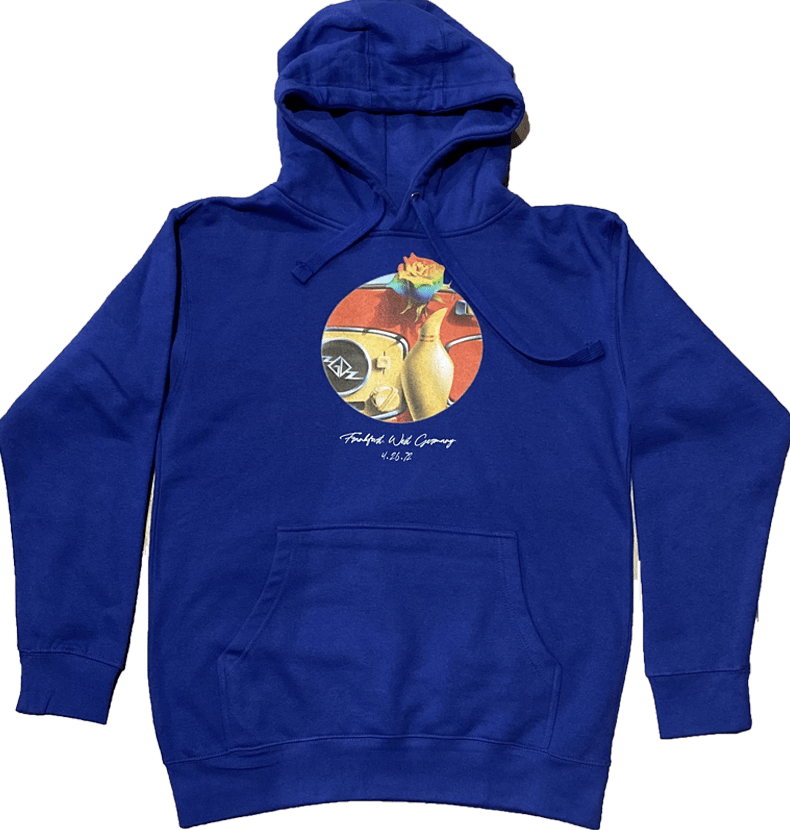
Limited Edition Hoodies

Purchase a Frankfurt, West Germany 4/26/72 Limited Edition Hoodie from Sec.119
The band teased a bit of “Zip-A-Dee-Doo-Dah” while tuning up between “You Win Again” and “El Paso.” The opening set also saw the tour’s first offering of keyboardist Ron “Pigpen” McKernan’s original “The Stranger (Two Souls In Communion),” which had been played a few times during the pre-Europe ‘72 shows held in New York City. “Casey Jones” once again held down the first set closer slot.
Set two began with Pigpen fronting the band on a spirited “Good Lovin'” that was trailed by the second of versions of “Dire Wolf” played on the tour. Familiar banter from Weir introduced a subsequent “Truckin’” with another reference to it being #1 on the charts in Turlock, California. The “Truckin’” lyrics were a bit elusive for Weir but that did not prevent it from leading into a jam that led to Kreutzmann’s drum solo.
The “Drums” segment bridged a segue into “The Other One,” which was mislabeled “Cryptical Envelopment” on Hundred Year Hall, possibly to make up for an error in crediting Garcia on a prior release. The April 26 “The Other One” contained monumental improvisation that totaled 36:27 in duration, making it the longest single track among the entire officially released Complete Europe ‘72 box set that came out in 2012 and presented the full tour, including the complete Jahrhunderthalle show with the tracks that were left off Hundred Year Hall.
From Robert Hunter’s liner notes describing “The Other One” escapade:
Phil thrums his first cue line for The Other One and the room begins to rock back and forth. Suddenly the band decides to go back and inspect that busted clock for a minute. Tension, release, tension, release. Drop back now and again, or you got nowhere to go. Bands that don’t learn that might sell more records but drop by the wayside.
Now occurs what makes this recording worth adding to your collection. Moments of gentle sweetness, repose. Jerry conversing idly with Phil, wondering if it was worthwhile to wake up today, inventing reasons it might have been. Believing them, provisionally. Suddenly a streetscene in wind blown San Francisco. Clouds gather. Weir tells a story in words of his own, sketch about a Spanish lady and a rose. Jerry tries a scale inimicable with the key and Phil follows him into the forest as percussion all but suspends until Billy decides to practice a little rudimental drumming on his own, off to the side, while Phil and Jerry consider the alchemy of scales. After awhile only an uninsistent but understood sense of tempo indicates this to be a piece of music in any sense this audience might comprehend. Jerry is considering E. 52nd Street in the ’50’s while Phil has meandered down to Basin Street. Bobby is pasting decal ducks on the blue tiled wall of a shower. Keith awakens once in awhile, but mostly dreams silent on the keys.
Now just Phil and Jerry make sound, a meditation of the face of Germany, our witness to this place in time. Then somebody discovers the knobs of his amplifier, twiddles them up and down, letting the guitar play itself as a Bauhaus era Paul Klee drawing constructs itself on the stage. Weimar has entered the hall. The Treaty of Versailles. Very tough to live with. Anger and economic disruption. Expressionist dismay. The rise of the right wing. Speed over the rest. Run the clock very fast. Tumble into the present with momentum the band agrees not to prevent – fly over Berlin, over the Wall – then circle west and follow the Rhine, whizz of the bus wheels down the Autobahn. Reintroduction of the theme of the song, rhythm following suit a few bars on as a nonchalant other one strolls out of the piece, steps lengthening until he, she or it is covering eight feet at a stride. “The bus came by and I got on.”
The second of four Europe ‘72 versions of the Garcia/Hunter ballad “Comes A Time” came out of “The Other One” madness. One of the few “Sugar Magnolia” performances of the tour not adjacent to “Dark Star,” followed. Interesting song choices continued as Pigpen’s showcase “Turn On Your Lovelight” was played for the first time in Europe. Pianist Keith Godchaux kept the back and forth between the band and Pigpen flowing, and continued leading another several minutes of intense improvisation.
A rare standalone “Going Down The Road Feeling Bad,” unaccompanied by “Not Fade Away,” brought the band ever so sweetly out of “Lovelight.” Gans specifically asked Weir and Lesh about this transition during the interview mentioned above. That ex
Gans: I wanted to talk about my favorite passage in this record, on the label it says “Lovelight->Goin’ Down the Road Feelin’ Bad,” but there’s a three-and-a-half-minute section in there — Jerry starts playing “Goin’ Down the Road Feelin’ Bad” at a very fast tempo, and the entire band sort of glides into a smoother tempo, and then somebody starts talkin’ “Not Fade Away,” and there’s a moment in here when half the band is playing “Not Fade Away” and the other half is playing “Goin’ Down the Road,” and then there’s more – tempo changes, harmonic interest, and there’s one moment where the “[We] Bid You Goodnight” theme from the end of “Goin’ Down the Road Feelin’ Bad” is happening – it’s just this beautiful, sort of telepathic, thing. You get all the way into “Not Fade Away,” and then say to heck with it and go straight to “Goin’ Down the Road” after all.
Lesh, Weir: [laughing]
Lesh: That’s the stuff that we dream about. That’s the stuff that we aim for, that’s the stuff that’s the most fun to do, and it’s the most magical… you can never predict what’s gonna happen. Although there are some factors that are involved – for instance, with only one drummer, we could turn faster, we could shift gears rhythmically, differently than we do with two. It’s like you’re heavier, and going faster with two drummers, and it’s hard to change direction. It’s like, it’s like a car or an airplane, the heavier, you know, and bigger it is…
Weir: Bigger engine, goes faster, but – it doesn’t turn on a dime.
Lesh: Yeah, so that was a particular thing we could do with tempo, and the thing about it was, it was never all in one direction – we could go faster or slower, and sometimes both at the same time. And, uh, it was just – those moments are, you know, true goose-bumpers, for me.
The Wednesday night gig came to an end with one of just two Europe ‘72 “One More Saturday Night” second set closers.
Here are additional statistics and information regarding the ninth performance of the Grateful Dead’s Europe ’72 tour:
At-a-Glance
The Show |
|
|---|---|
|
April 26, 1972 |
|
|
8 p.m. |
|
|
DM 14 |
|
|
4,800 |
|
|
136 |
|
The Music |
|
|
20 songs / 109 minutes |
|
|
8 songs / 118 minutes |
|
|
28 Songs / 227 minutes |
|
|
The Other One 36:27 |
|
|
Chinatown Shuffle 2:58 |
|
|
9:23 |
|
|
12 Jerry / 11 Bobby / 5 Pigpen |
|
|
8 |
|
|
47 |
|
Setlist (via JerryBase)
Set One: Bertha [1], Me And My Uncle [1], Mr. Charlie, He’s Gone, Black Throated Wind, Next Time You See Me [1], China Cat Sunflower [1] > I Know You Rider [1], Jack Straw [1], Big Railroad Blues [1], Playing In The Band [1], Chinatown Shuffle, Loser, Beat It On Down The Line, You Win Again, El Paso, Tennessee Jed, Greatest Story Ever Told, The Stranger (Two Souls In Communion) [2], Casey Jones
Set Two: Good Lovin’ [3], Dire Wolf [3], Truckin’ [1] > Drums [1] > The Other One [1] > Comes A Time [1] > Sugar Magnolia [1], Turn On Your Lovelight [1] > Goin’ Down The Road Feelin’ Bad [1] > One More Saturday Night [1]
Notes:
- [1] released on Hundred Year Hall
- [2] released on The Golden Road (1965 – 1973)
- [3] released on Europe ’72 Volume 2
Below, stream the official recording of the Grateful Dead’s April 26, 1972 concert at Rheinhalle in Frankfurt, West Germany and Hundred Year Hall, or check out other recordings via Archive.org:
-

Grateful Dead’s Europe ‘72 Tour 50th Anniversary: April 14 – Copenhagen, Denmark
-

Grateful Dead’s Europe ‘72 Tour 50th Anniversary: April 16 – Aarhus, Denmark
-

Grateful Dead’s Europe ‘72 Tour 50th Anniversary: April 17 – Copenhagen, Denmark
-

Grateful Dead’s Europe ‘72 Tour 50th Anniversary: April 21 – Bremen, West Germany
-

Grateful Dead’s Europe ‘72 Tour 50th Anniversary: April 24 – Dusseldorf, West Germany
